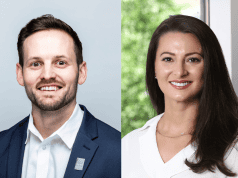One of the first rules of medicine is to “do no harm.” Unfortunately, medical mistakes are not uncommon. According to “Patient Safety 101,” a 2019 article published by the Patient Safety Network, somewhere between 10 to 12 percent of hospitalized patients experience adverse events, with nearly half of these deemed avoidable. While progress has been made, the Patient Safety Network notes that “rates of preventable harm among patients remain unacceptably high.”

This April, ten multidisciplinary teams of students across Emory University were tasked with improving patient safety as part of this year’s 2040 Healthcare Futuring Competition. Organized by the Goizueta Healthcare Association under the direction of Renee Dye, associate professor of Organization & Management, the Healthcare Futuring Competition asked the student teams to consider five categories of medical harm that contribute to the majority of morbidity and mortality: medication errors, procedural/surgical safety problems, patient care (falls, pressure injuries, blood clots), infections, and diagnostic safety issues (wrong, missed, and delayed diagnosis).
The competition challenged students to use futuring, an advanced strategy tool that focuses on long-term outcomes, to envision a 2040 healthcare environment that would produce better patient safety outcomes. To prepare students, the Goizueta Healthcare Association provided data, resources, and workshops—and then students were off to the races.
Emory Students from Diverse Disciplines Deliver Game-Changing Insights
In April, four finalist teams presented their scenarios to a panel of judges, each of whom represented a different aspect of the healthcare industry. The winning team received a $1500 prize, and the runner up took home $1000.
“We had an intriguing mix of disciplines and schools in the competition this year – business, public health, math, and engineering—from across Emory and Georgia Tech,” noted Dye.
Healthcare faces challenges on multiple fronts, so the contributions from multiple fields are sure to advance our understanding and innovation potential. Notably, in this third year of the competition, each and every presentation featured AI-driven technology and digital solutions as game changers to improve patient outcomes.
Renee Dye, associate professor of Organization & Management

Team BioFuture, the winning team, featured LuisRene Mata Quinonez and Imran Shah, two Biomedical Engineering PhD students enrolled in a dual program between Georgia Tech and Emory University. The pair worked alongside Leonardo Molinari, a PhD student in Mathematics at Emory. “I’ve never taken a business class in my life. [The competition] helped us see what it would be like to take this technology to the actual clinic. It was an eye-opening experience,” explained Shah.
Team BioFuture’s 2040 healthcare scenario centered on integrated computational facilities (ICFs) that use clinical-based computational services to arrive at better patient outcomes. By using centralized data storage on site, ICFs can create “digital twins” for each patient, allowing for computational simulations and modeling that can lead to personalized treatment. Their scenario also included the use of wearable technology to enhance early detection of life-threatening conditions.

Stein Wang 24MBA and Stephanie Wong 24MBA, both students in Dye’s Innovation Strategy class this semester, took home the runner up prize. As Team Human Errors Medication Errors, their scenario addressed how to minimize mistakes and complications from medication errors. This included genetic sequencing to produce precise, personalized medicine, 3D printed medications that allow for customized dosages, and the use of biometric blockchain to enhance cyber security. “We were able to use tools we learned in Professor Dye’s class to identify pain points and create ways to solve those problems,” explained Wong. Wang noted that the team’s business background helped them use data to make their case.

Team Beyond Tomorrow, with members Manju Ramakrishnan, Rollins School of Public Health, Mina Milosavijevic, Emory School of Medicine and Tejas Mayekar 24MBA focused on how technology could be used to reduce medication errors and hospital-acquired infections. In its scenario, Team Foresight, comprised of Rollins School of Public Health students Hans Khoe, Gracie Landram, and Foster Ritchie, used AI-based patient safety measures and universal electronic medical records that allowed for real-time patient updates.
Competition organizer Richard Xie 23MBA and Goizueta Healthcare Association’s Executive Vice President, isn’t aware of any other MBA program with a similar competition.
“It sets Goizueta apart,” Xie said. Xie credits Dye with making the competition a success. “Her involvement has been immense,” Xie explained. “Without it, this competition wouldn’t exist.”
Swetha Rajagopalan 23MBA/MPH and Goizueta Healthcare Association President who helped lead one of the workshops, was glad to have been a part of the competition. “It was exciting to see the diversity of thought from the PhD students and the business students come together to develop a plan and a vision,” she said. Rishab Pradeep Padukone 23MBA, Goizueta Healthcare Association vice president of competitions, was impressed that “each team had a different vision of what AI could do in the future,” he said.
The panel of judges included Arujun Srinivasan, MD (CAPT, USPHS), associate director for healthcare-associated infection prevention programs, Division of Healthcare Quality Promotion, CDC’s National Center for Emerging and Zoonotic Infectious Diseases, Harry Gerard, manager, Lab2Launch and associate director, Biolocity, Emory School of Medicine, Natasha Rishi-Bohra, Healthcare Strategy and Transformation, Evolent Care Partners, and Steven Culler, associate professor, Rollins School of Public Health and affiliated associate professor, Goizueta Business School.
Find out more about the Goizueta Healthcare Association’s Healthcare Futuring Competition.











